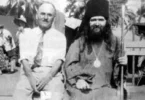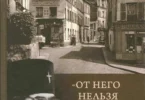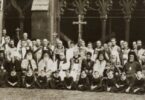From the Editor
On December 7, 1965, Pope Paul VI of Rome (d. 1978) and Patriarch Athenagoras withdrew the mutual orders of ex-communication invoked by Cardinal Humbert and Patriarch Michael I Cerularius in the 11th century. On December 15, 1965, Metropolitan Philaret wrote an open letter to Patriarch Athenagoras that reads:
“The Tradition of the Church and the example of the Holy Fathers teach us that there can be no dialogue with those who have broken away from the Orthodox Church. […] We urgently entreat Your Holiness to put an end to this temptation, for the path you have chosen, while it may lead you to union with the Roman Catholics, would cause division in the Orthodox world, since it is doubtless that many of your spiritual children would prefer to remain faithful to Orthodoxy over the ecumenical idea of uniting with the heterodox through compromise and without being fully united with them in the truth. Asking for your holy prayers, I remain a devoted servant of Your Holiness, Metropolitan Philaret, Chair of the Council of Bishops of the Russian Orthodox Church Outside of Russia.” (Pravoslavnaia Rus′ no 3, 1966).
This indeed what happened: this new trajectory led to zealots of Orthodoxy being drawn to the Russian Church Abroad. By a resolution of the Synod of Bishops on December 22, 1965, the Greek Holy Transfiguration Monastery in the greater Boston, which had been under the Patriarchate of Constantinople, was received into the Russian Church Abroad without a letter of canonical release. This led to a change in the status quo from Metropolitan Anastasy’s tenure as First Hierarch, as reflected in a report of Saint John of Shanghai and San Francisco to the Second All-Diaspora Council in 1938, titled “The Status of the Orthodox Church after the War:”
“Previously, the breaking off of canonical communion was used as a means to denounce canonical irregularities in the actions of a local Church. The Russian Church Abroad does not have the ability to act in this way, since her status has not been completely determined or confirmed. For this reason, she ought not to break off communion with other Churches if they have not taken this step first. Yet while maintaining communion, she should not remain silent about breaches of justice in the church.”
It was in this way that the Russian Church Abroad, initially a church for Russian refugees, began to turn into a sanctuary for “refugees” from other Local Churches and converts from other Christian denominations. On January 23, 1968, Archbishop Iakovos sent a telegram to Metropolitan Philaret asking him not to receive into the ROCOR Priest Nikitas Palassis (d. 2017), who had been suspended by the Greek Archdiocese for his criticism of the ecumenical activities of his own church hierarchy. On February 10, 1968, on the basis of Canon 15 of the First-and-Second Council (861), Fr. Nikitas Palassis was received into the ROCOR by the Russian Church Abroad; this was approved on February 17 of the same year by the Synod of Bishops.
Every historical phenomenon ought to have a reference point in prior history. In this particular case, such a basis might be provided by the reception of political refugees from the countries of the Soviet block into the ROCOR and the creation of Romanian and Bulgarian church structures within the ROCOR under Metropolitan Anastasy following World War Two.[1]I am grateful to Reader Andrei Anishchenko for pointing out this fact in his term paper, “The Context of the Sorrowful Epistles of Metropolitan Philaret and Their Contribution to the Development of … Continue reading
On the First Sunday in Lent, 1969, Metropolitan Philaret issued an open admonition to Archbishop Iakovos, containing the following words: “We protest your un-Orthodox ‘Ecumenical Prayer Service’ and His Holiness Patriarch Athenagoras’ incorporation of the Pope of Rome and ‘of all the Confessions of East and West’ into the dyptichs, as stated in His Holiness’ Christmas encyclical.”
On July 27, 1969, Metropolitan Philaret issued a Sorrowful Epistle addressed to all Orthodox bishops. However, it does not contain any proposals for a conciliar condemnation of ecumenism, nor does it allow for the possibility of a different approach within the Orthodox tradition. The result is a monologue rather than a dialogue – in which, for example, Protopresbyter Alexander Schmemann (d. 1983) might have taken part (his reply to the First Sorrowful Epistle is reproduced below).
At the same time as Sorrowful Epistles were issued, the Russian Church Abroad continued to pursue a trajectory of isolation from other local churches. On December 31, 1969, the ROCOR Synod recognized consecrations of bishops for Archbishop Auxentios Patras’ Old Calendarist Synod that had been performed earlier by ROCOR bishops without Metropolitan Anastasy’s blessing.
Metropolitan Philaret’s second Sorrowful Epistle was written on the First Sunday in Lent, 1972, and also draws the attention of Orthodox bishops to the matter of participation in the ecumenical movement. While renouncing its attempts to fight for Orthodoxy within the Local Churches, the ROCOR buttressed the True Orthodox by consecrating bishops of the so-called Matthewite Greek Old Calendarist Synod in Holy Transfiguration Monastery in Brookline, MA on September 30, 1971. One of the Matthewites’ demands in order for them to enter into communion with the ROCOR was that the latter cease prayerful communion with New Calendarists and ecumenists.
One practical consequence of this new orientation towards Orthodox zealots can be seen in Archpriest George Grabbe’s report to the President of the Synod of Bishops on December 7, 1972, protesting the prayerful communion of Archbishop Nikon (Rklitsky, d. 1976) and Bishop Laurus (Škurla, d. 2008) with Archbishop Iakovos at the Greek church in Flushing during the visit of the relics of Saint Nicholas. The protest was motivated by the fact that, according to resolutions of the ROCOR Synod of Bishops from 1967 and 1971, ROCOR clergy were to avoid any kind of communion ecumenist bishops, all the more so seeing as the ROCOR had received clerics who had broken away from them for “reasons of dogma.” [2] ROCOR Synod Archive.
Metropolitan Philaret’s third Sorrowful Epistle saw the light of day on December 19, 1975, as a review of a book by Archbishop Athenagoras (Kokkinakis, d. 1979) of the Ecumenical Patriarchate in Great Britain, The Thyateira Confession: The Faith and Prayer of Orthodox Christians (The Faith Press, 1975). This book, which was conceived as a profession of faith for the Orthodox Church, caused consternation among the Orthodox, above all in Great Britain. For instance, with the permission of Metropolitan Antony of Sourozh (Bloom, d. 2003), Priest Job Dubois transferred to the Russian Church Abroad in December 1975. The publication of this book could, again, have served as the groundwork for dialogue. For example, even before the third Sorrowful Epistle was published, Archpriest John Meyendorff, editor of the official publicity organ of the Orthodox Church in America, pointed out the problems with Archbishop Athenagoras’ book (“The ‘Thyateira Confession’,” The Orthodox Church, September 1975).
Things thus worked out such that the new course signaled by Metropolitan Philaret as First Hierarch did not foresee the dangers of having a double standard for oneself and others, nor did it make room for the understanding that one can err “to the right” as well as “to the left,” since alternative theological approaches within the limits of the Tradition of the Orthodox Church are indeed possible. On a practical level, anti-ecumenical rhetoric did not help the ROCOR to view itself critically while remaining indifferent or showing a lack of compassion for “outsiders.” The ROCOR began to be perceived by her members as a gold standard of Orthodoxy. This image became very attractive for many potential new converts, who started to come to the ROCOR due to problems in their own Christian denominations. The challenge they faced was not to be troubled and not to look further after discovering that the traditions and practices of the ROCOR did not always fit with their conception of traditional Orthodoxy.
Deacon Andrei Psarev, January 25, 2021
Metropolitan Philaret, The First Sorrowful Epistle
Metropolitan Philaret, The Second Sorrowful Epistle
Metropolitan Philaret, The Third Sorrowful Epistle
Archpriest Alexander Schmemann, On the “Sorrowful Epistle” of Metropolitan Philaret
References
| ↵1 | I am grateful to Reader Andrei Anishchenko for pointing out this fact in his term paper, “The Context of the Sorrowful Epistles of Metropolitan Philaret and Their Contribution to the Development of the Russian Orthodox Church Outside of Russia.” The Pastoral School of Chicago and Mid-America. 2013. |
|---|---|
| ↵2 | ROCOR Synod Archive. |











I delighted reading in this paper about those events which surrounded and sparked the flame in writing the Sorrowful Epistles. For historical reasons, I would have wanted to have read the names of both the Auxentioite and Mathewite bishops who were regularized by ROCOR bishops. And which bishops of ROCOR were present at those services. I knew many of the personalities in this paper and I enjoyed reading of the circumstances from the Russian perspective. Thank you.
Thank you for this detailed historical information, again! One minor suggestion: I think the description of the Sorrowful Epistles as attracting converts could be qualified. I think few if any American converts would have known of the sorrowful epistles, which were much more of an “inside the Russian Church community” issue. The appeal of ROCOR to converts it seems to me has rested primarily on liturgical and doctrinal practices and as always with experiences of the example of people’s lives, and perhaps also identifying ROCOR with Christian witness against secular totalitarianism. Within Orthodoxy in North America today, it’s true, I think there is heightening awareness of the split between Moscow and Constantinople, and ROCOR may be appealing to a number of people because of that. But that is more a potential attraction of ROCOR among people who are already Orthodox, rather than converts. Worshipping in a ROCOR community of mainly American converts, I don’t know of any who were attracted (and probably few if any who know) about the sorrowful epistles and related issues. Maybe they should! And maybe my suggestion makes too much of a small issue of terminology, forgive me. It doesn’t take away from my enjoying and learning from these posts!
Dear Father Paul,
I agree. Your point is taken. Thank you very much for taking the time to comment.
“For instance, with the permission of Metropolitan Antony of Sourozh (Bloom, d. 2003), Priest Job Dubois transferred to the Russian Church Abroad in December 1975.” A small historical correction. The name of the priest is Yves, not Job. He began preaching against ecumenism to our convert parish in Guildford, England in 1975. We agreed with him that he would try and persuade Anthony Bloom to leave the World Council of Churches, and if he did not, that we would leave with him (Fr. Yves) at our head. Bloom’s reaction was negative, so we asked Fr. Yves to lead us out of the MP. But he refused! So we, after an unsuccessful meeting with Bloom in September, left the MP and were received by ROCOR’s Archbishop Nikodem of Great Britain on October 1/14, 1975. Fr. Yves followed a little later – but through the Synod in New York, not through Archbishop Nikodem, whom he did not like for some reason. Later he joined Constantinople. I think he is still there.
The only sad thing is the fact that today we don’t have Holy Metropolitan Philaret with us on Earth, so that he can repeat everything he said and silence all the little cowardly souls who crawled out after his repose and started perverting or straight denying his holy words, because those were not his own words, but inspired words of the Holy Spirit.
His Sorrowful Epistles are the beacon light of Orthodoxy – perhaps one of the few reasons why God is still bearing with this every increasing apostasy and blatant treason of Orthodoxy.
If it lasts, history will prove that Met. Philaret’s Epistles will be held by the Orthodox on the same (if not higher) pedestal than even the Encyclical Letter of St. Mark of Ephesus; just as it will prove that Orthodox will keep the sorry memory of Athenagoras on the same (if not lower) place than that of Isidore of Kiev.
But back to article. I am surprised with the lack of scholar’s rigor in it. It really reads as if it was written by a high school student (and I mean no offense to the Author – this is just an honest assessment of his work). The only alternative answer would be a complete bias and malice on the Author’s end, which I choose to believe not to be the case.
The concluding paragraph is the pinnacle of this ignorance, where Author says:
“Things thus worked out such that the new course signaled by Metropolitan Philaret as First Hierarch did not foresee the dangers of having a double standard for oneself and others, nor did it make room for the understanding that one can err “to the right” as well as “to the left”.”
Only a person who didn’t do any serious historical study (e.g. the case of “Boston monastery” departure from ROCOR because of feigned care for the purity of faith) could say that Met. Philaret didn’t understand the basic presupposition of any spiritual life: avoiding temptations from left and right and staying on the narrow middle path.
Only a person who doesn’t see the Church as anything more than human organization could conclude that ROCOR was ever only “a church for Russian refugees, [which] began to turn into a sanctuary for “refugees” from other Local Churches and converts from other Christian denominations.”
Those who see and live the Church as continuation of Incarnation, as Body of Christ, saw ROCOR as the last place on Earth “where Truth of Her Son is still being fully upheld”, as Mother of God revealed to the venerable Elder Ephraim.
Those in Church always transcend historical circumstances alone and look for ontological dimension. This is how we know that ROCOR was never only “a church for Russian refuges”, but believe together with St. John of Shaghai and San Francisco that it was a special mission assigned by our Lord God to the Russian people to bear witness of Him in lands which didn’t met Him yet.
Only a person who never read (or read it with mouth only) Met. Philaret’s third Sorrowful Epistle – an answer to the shameful raving of Pat. Athenagoras could think or write that Metropolitan Philaret took any other approach to this question but the Royal Path approach, and perfectly balanced at that.
No, nothing changed in the eternal value of Metropolitan Philaret’s Sorrowful Epistles, they’re still as sorrowful, and as balanced and true as they ever were. The only thing that changed is us, in our ignorance and audacity to approach these most difficult questions with nothing more but “a month or a year of “research””, and share our equally invaluable thoughts on it, imagining that we ourselves are spiritual, or forgetting that those who are truly spiritual (as Met. Philaret undoubtedly was) are “judged of no man” (1 Cor. 2:15).
Well said, Slobodan. Metropolitan Philaret is a saint. His body is incorrupt, he works miracles. His sorrowful epistles are a paragon of Orthodoxy. His Synod’s anathema against Ecumenism is, in my view, the most important ecclesiastical decision of the last 100 years. It proclaims that all the ecumenist World Orthodox – including the Moscow Patriarchate, as he confirmed to me personally – are outside the True Church of Christ. He veered neither to the right nor to the left. He simply told the truth. Yes, Slobodan, his confession is on a par with St. Mark’s. May all Orthodox Christians come to recognise that!
Thank you, Slobodan, and Vladimir Moss for your truthful comments! I was a child under age 7 when I saw Metropolit Filaret within a Heavenly light, surrounding only him, not Bishop Serafim, as they both stood side by side on the elevated platform in the middle of the Church during Liturgy. I stood still and after service I told my mother Metropolit Filaret is an Angel…